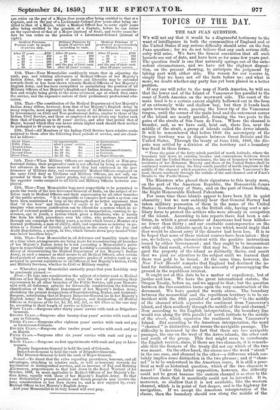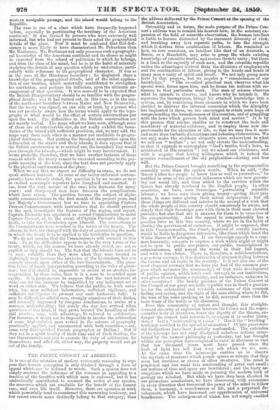TOPICS OF THE DAY.
THE SAN JUAN QUESTION.
WE will not say that it would be a disgraceful testimony to the want of intelligence in both the communities of England and at the United States if any serious difficulty should arise on the San Juan question ; for we do not believe that any such serious diffi- culty will arise. We have the firmest oonvietion that all such hazards are out of date, and have been so for some few years past. The question itself is one that naturally springs out of the ante- cedent circumstances, and we have not the slightest disposi- tion, on the present showing, to anticipate the judgment by taking part with either side. The reason for our reserve is, simply that we have not all the facts before us ; and what is more, we doubt whether any party has yet been placed in a better position.
If any one will refer to the map of North America, he will see that the lower end of the Island of Vancouver lies parallel to the coast of North America on the westward side. The coast of the main land is to a certain extent slightly hollowed out in the form of an extremely wide and shallow bay, but then it bends back again towards the west, passing the lower tip of the Vancouver tongue, until the corner of the main land and the outermost corner of the island are nearly parallel, forming the two posts to the gates of the straits of San Juan de Fuca. Where the channel is broader, and, as we have said, bent out, there lies, near the middle of the strait, a group of islands called the Arroo islands. It will be remembered that before 1846 the sovereignty of the Oregon territory was in dispute between Great Britain and the United States. Through the treaty of June 15th, 1846, the dis- pute was settled by a division of the territory and a boundary was fixed in these terms.
" From the point of the forty-ninth parallel of north latitude, where the boundary laid down in existing treaties and conventions between Great Britain and the United States terminates, the line of boundary between the territories of her Britannic Majesty and those of the United States shall be continued westward along the forty-ninth parallel of north longitude to the middle of the channel which separates the Continent from Vancouver's Is- land, thence southerly through the middle of the said channel and of Fuca's Straits to the Pacific Ocean.
The Ministers who placed their signatures to this treaty were, on the part of the American Republic, the Honourable James Buchanan, Secretary of State, and on .the part of Great Britain, the Right Honourable Richard Pakenham. For some time these islands appear to have been left in quiet obscurity; but we now suddenly hear that General Harney had taken military possession of them in the name of the United States ; Governor Douglas, on the British side, having sent a mi- ll. force to protect the settlers who were already in occupation of the island. According to late reports there had been a col- lision, in which a great number of Americans had been killed— no fewer than thirty ; and our excitable contemporaries on the other side of the Atlantic speak in a tone which would imply that they would be almost sorry if the disaster had been less. It is to be hoped that none of these violent courses have been taken : they are, we believe, quite inconsistent with the positive instructions issued by either Government ; and they ought to be inconsistent with the final result, whatever that may be. The Americans re- gard. the property of the island as distinctly theirs, and assert that we paid no attention to the subject until we learned that there was gold to be found. At the same time, however, the New York Herald remarks that England had destined the is- land for fortification, and urges the necessity of preoccupying the ground in the republican interest.
It ought not at this date to be a matter of expediency, but of justice and law. W e have the great international statute, the Oregon Treaty, before us, and we appeal to that; but the question between the two countries turns upon the very construction of the document. We have quoted the words above. The boundary between the monarchial and the republican territory is to be co- incident with the 49th parallel of north latitude " to the middle of the channel which separates the continent from Vancouver's island, and then southerly through the middle of the said channel." Now according to the 1,nglish interpretation, the boundary line would run along the 49th parallel of north latitude to the middle of the strait, which separates the continent from Vancouver's Island. But according to the American interpretation, the word " channel " is distinctive, and means the navigable passage. The difficulty is increased by the fact that there are two navigable
passages, the one on the west of the Arroo islands, the other east and south of the group. This fact might seem to corroborate the English version, since, if there are two channels, it is remark-
able that the framers of the treaty did not say which of the two was meant. On the other hand, the clause uses the word " strait" in the one case, and channel in the other—a difference which cer- tainly implies some distinction in the two phrases ; and if " chan- nel" is to be understood in the American sense, it is still a prac- tical as well as historical question, which of the two channels is meant? Under this latter supposition, however, the difficulty could not be great because the eastern channel is so close to the American shore that it manifestly could not be intended. It is,
moreover, so shallow that it is not available, like the western channel, which is in point of fact deeper, and is the highway for navigation. If we accept the American interpretation ox the clause, then the boundary should run along the middle of the
western navigable passage, and the island would belong to the Republic.
The case is one of a class which have frequently happened before, especially in partitioning the territory of the American continent. It was framed by persons who were extremely well informed, but who had not present to -their mind the geographical details of the place. Now it must be confessed that this defi- ciency is more likely to have characterized Mr. Pakenham than Mr. Buchanan. Mr. Buchanan-not only possesses such a geographi- cal knowledge of the American continent and its shores as might be expected from the school of politicians to which he belongs, and from the class of his mind, but he is in the habit of minutely studying the details of any question which he undertakes, parti- cularly with reference to its geographical character. It was so in the case of the Honduras boundary ; he displayed there a knowledge of the geographical details, and of the strict.applica- tion of our treaties, which materially contributed to strengthen his conviction, and perhaps his influence, upon the ultimate ar- rangement of that question. it was scarcely to be expected that the British Plenipotentiary should be so familiar with the geogra- phical details ; and it has turned out, in this case, as in the case of the north-east boundary between Maine and New Brunswick, that the treaty was signed, on one side at least, by a person who was not precisely aware how the terms would apply to the topo- graphy or what would be the effect of certain constructions put upon the text. The difficulties in the British construction are not merely verbal. The maps whichwe have seen, although some of them are of considerable size, do not really exhibit the boun- daries of the island with sufficient precision, and, wemay add, the maps vary from each other in a manner not creditable to geogra- phical draftsmen. But putting the broadest acceptation upon the delineation of the straits and their islands, it does appear that if the British construction were carried out, the boundary line would pass through the islands,—which might be very inconvenient. It seems probable, therefore, that we have another instance of those cases in which the treaty cannot be executed according to the pal- pable meaning of the text, since the text does not precisely apply to the physical conformation of the place.
When we say that we expect no difficulty to ensue, we do not speak without warrant. As some of our better-informed contem- poraries have already stated, the question is by no means so new as excited newspaper reporters have imagined and asserted. It has, from the very nature of the case, lain dormant for many years ; and sharp-eyed men have foreseen the complications which have arisen. The question became the subject of diplo- matic communications in the first month of the present year, and her Majesty's Government lost no time in appointing Captain Prevost Commissioner, with instructions that he should proceed to the spot, investigate the features of the region, and report. Captain Richards was appointed as second Commissioner to assist Captain Prevost, or, in the event of Captain Prevost's illness or death, to take the Commission upon himself. The instructions to the Commissioners were couched in the terms of the treaty. The officers, in fact, are charged with the duty of ascertaining the mode in which the treaty is to be Applied to the territories in question. We do not assume that the Commissioners will succeed in this task. To us the difficulties appear to lie in the very terms of the treaty, which, for the reasons we have already stated, are not so explicit as they should be. The fact that the islands turn out to be more valuable than they were when they were treated so slightingly may increase the anxieties of the bystanders, but can scarcely operate upon either of the two Governments. The ques- tion is one of treaty interpretation according to the rules of gram- mar : but if it should be impossible to arrive at an absolute in- terpretation by those rules, then it is a case to be settled upon equity. It is preposterous to suppose that the vast interests at stake can for one moment be imperilled by any indiscreet act or word on either side. 'We believe that the public, in both coun- tries, has now sufficient information, sufficient vigilance, and sufficient intelligence to prevent any such barbarous folly. It may be difficult for official men, strongly conscious of their duties, and naturally impressed by foregone conclusions, to arrive at a common understanding ; but surely the day has arrived when questions of this kind, if they prove beyond the handling of offi- cial routine, may, with advantage, be referred to arbitration. For instance, it would not be impossible to invoke the arbitration of some high-minded man versed in the science of geography practically applied, and unconnected with both countries,—say, some very distinguished French geographer or Italian ? But if they act in a spirit worthy of their time and of their destiny, the two Governments can join to execute the duty of arbitration for themselves; and after all, either way, the property would not go out of the family.



























 Previous page
Previous page